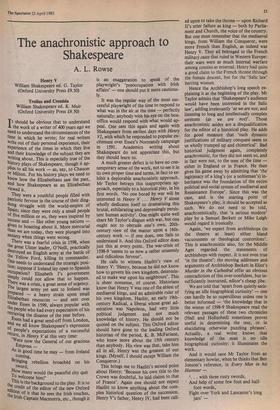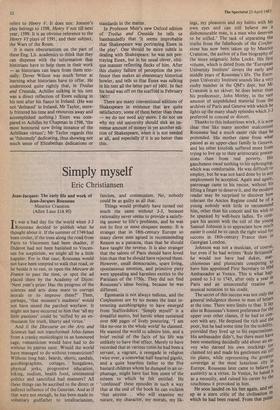The anachronistic approach to Shakespeare
A. L. Rowse
Henry V William Shakespeare ed. G. Taylor (Oxford University Press £9.50) Troilus and Cressida William Shakespeare ed. K. Muir (Oxford University Press £9.50)
It should be obvious that to understand the work of a writer of 400 years ago we need to understand the circumstances of the
time in which he wrote; for real writers write out of their personal experience, their experience of the times in which they live and their knowledge of the subject they are writing about. This is especially true of the history plays of Shakespeare, though it ap- plies to all his work — as, say, to Chaucer or Milton. For his history plays we need to know how the Elizabethans saw the past, and how Shakespeare as an Elizabethan viewed it.
They were a youthful people filled with Patriotic fervour in the course of their ding- dong struggle with the world-empire of Spain; since they were only a small people of five million or so, they were inspired by success and — like other young nations given to boasting about it. More mercurial than we are today, they were plunged into anxiety when things went wrong. There was a fearful crisis in 1598, when the great Ulster leader, O'Neill, practically destroyed an English army at the battle of the Yellow Ford, killing its commander. One needs to understand the strategic posi- tion: suppose if Ireland lay open to Spanish occupation? Elizabeth I's government supply could not allow that to happen. There was a crisis, a great sense of urgency. The largest army yet sent to Ireland was Prepared — a heavy strain upon small Elizabethan resources — and sent over under Essex in 1599, always popular with the People who had every expectation of his retrieving the disaster of the year before. Essex had a great send-off from London, and we all know Shakespeare's expression of People's expectations of a successful return, in Henry Vat this very time:
Were now the General of our gracious Empress - As in good time he may — from Ireland coming, Bringing rebellion broached on his `word,
How many would the peaceful city quit To welcome himl' This is the background to the play. It is to the credit of the editor of the new Oxford edition of it that he sees the Irish touches, the Irish Captain Macmorris, etc., though it is an exaggeration to speak of the playwright's 'preoccupation with Irish affairs' — one should put it more cautious- ly.
It was the regular way of the most suc- cessful playwright of the time to respond to what was in the air at the time — perfectly naturally: anybody with his eye on the box- office would respond with what would ap- peal. One sees this again and again with Shakespeare from earliest days with Henry VI, with which he responded to popular ex- citement over Essex's Normandy campaign in 1591. Academics writing about Shakespeare do not appreciate this, but they should learn to.
A much greater defect is to have no con- temporary sense of the work, not to see it in its own proper time and terms, in fact to ex- hibit a deplorable anachronistic approach. Mr Taylor betrays this inappropriate ap- proach, especially to a historical play, in his first words. `No one bored by war will be interested in Henry V ... Henry V alone wholly dedicates itself to dramatising this brutal, exhilarating and depressingly persis- tent human activity'. One might quite well share Mr Taylor's disgust with war, but one ought not to obtrude one's own, 20th- century view of the matter upon a 16th- century work — if one does, one fails to understand it. And this Oxford editor does just this at every point. The war-crisis of 1598-9 'seems to us now a rather unseemly and ridiculous fervour'.
He calls to witness Hazlitt's view of Henry V: 'Henry, because he did not know how to govern his own kingdom, determin- ed to make war upon his neighbours'. This is sheer nonsense, of course. Historians know that Henry V was one of the ablest of mediaeval kings, and an admirable ruler of his own kingdom. Hazlitt, an early 19th- century Radical, a liberal whose great ad- miration was Napoleon, had very little political judgment and not much knowledge of history. He should not be quoted on the subject. This Oxford editor should have gone to the leading Oxford historian of the period, K. B. McFarlane, who knew more about the 15th century than anybody. His view was that, take him all in all, Henry was the greatest of our kings. (Myself, I should except William the Conqueror.) This brings me to Hazlitt's second point about Henry: 'Because his own title to the Crown was doubtful, he laid claims to that of France'. Again one should not expect Hazlitt to know anything about the com- plex historical question of the succession. Henry V's father, Henry IV, had been call- ed upon to take the throne — upon Richard II's utter failure as king — both by Parlia- ment and Church, the voice of the country.
But one must remember that the mediaeval kings, from William the Conqueror, were more French than English, as indeed was Henry V. They all belonged to the French military caste that ruled in Western Europe:
their wars were as much internal warfare among cousins as external. Henry had quite a good claim to the French throne through the female descent, but for the 'Salk law' barring women.
Hence the Archbishop's long speech ex- plaining it at the beginning of the play. Mr Taylor admits that 'Shakespeare's audience
would have been interested in the Salic law', adding irrelevantly 'as we are not, and listening to long and intellectually complex sermons (as we are not)' . Those anachronistic asides are a disqualification
for the editor of a historical play. He adds for good measure that 'such dynastic justifications of military conquest seem to us wholly trumped up and chimerical'. Bad historical judgment again, completely anachronistic, for they did not seem so, and in fact were not, to the men of the time - either in England or in France. He then gives his game away by admitting that 'the legitimacy of a king's (or a nobleman's) in- heritance was the foundation of the entire political and social system of mediaeval and Renaissance Europe'. Since this was the case, and is the starting point of Shakespeare's play, it should be accepted as such. We do not need to be told, anachronistically, that 'a serious modern' play by a Samuel Beckett or Mike Leigh would regard it ironically.
Again, 'we expect from archbishops (in the theatre at least) either bland vacuousness or theological contortions'.
This is anachronistic also, for the Middle Ages regarded the statements of archbishops with respect. It is not even true 'in the theatre': the moving addresses and arguments of Archbishop Beckett in Eliot's
Murder in the Cathedral offer an obvious contradiction of this over-confident, but in- sufficiently instructed, editor's cheap jibe.
We are told that 'apart from quietly satis- fying an idle biographical curiosity' — one can hardly be so supercilious unless one is better informed — 'the knowledge that in the winter of 1598-9 Shakespeare read the relevant passages of these two chronicles (Hall and Holinshed) sometimes proves useful in determining the text, or in elucidating otherwise puzzling phrases'. Actually, a real writer knows that knowledge of the man is no idle biographical curiosity: it illuminates the work.
And it would save Mr Taylor from an elementary howler, when he thinks that Ben Jonson's reference, in Every Man in his Humour — . . with three rusty swords,
And help of some few foot and half- foot words, Fight over York and Lancaster's long jars' —
refers to Henry V. It does not: Jonson's play belongs to 1598, Henry V not till next year, 1599. It is an obvious reference to the Henry VI plays of 1591, and their subject, the Wars of the Roses.
It is mere obscurantism on the part of these Eng. Lit. academics to think that they can dispense with the information that historians have to help them in their work — as historians can learn from them text- ually. Dover Wilson was much better at learning what historians have to offer. He understood quite rightly that, in Troilus and Cressida, Achilles sulking in his tent was a direct reflection of Essex sulking in his tent after his fiasco in Ireland. (He was not 'defeated' in Ireland, Mr Taylor, mere- ly frittered his time and resources away and accomplished nothing.) Essex was com- pared to Achilles by Chapman in 1598, 'the most honoured now living instance of the Achillean virtues'; Mr Taylor regards this as 'fulsomely' dedicating, thus showing not much sense of Elizabethan dedications or
standards in the matter.
In Professor Muir's new Oxford edition of Troilus and Cressida he tells us hamhandedly that 'it seems improbable that Shakespeare was portraying Essex in the play'. One should be more subtle in dealing with Shakespeare: he was not por- traying Essex, but in his usual clever, obli- que manner reflecting flecks of him. After this clumsy failure of perception the pro- fessor then makes an elementary historical howler, and tells us that Essex was sulking in his tent all the latter part of 1601. In fact his head was off on the scaffold in February 1601!
There are many conventional editions of Shakespeare in existence that are quite satisfactory, some of them better than these — we do not need any more. I do not see why my old university should sink an im- mense amount of money in yet another edi- tion of Shakespeare, when it is not needed at all, and especially if it is no better than this.











































 Previous page
Previous page